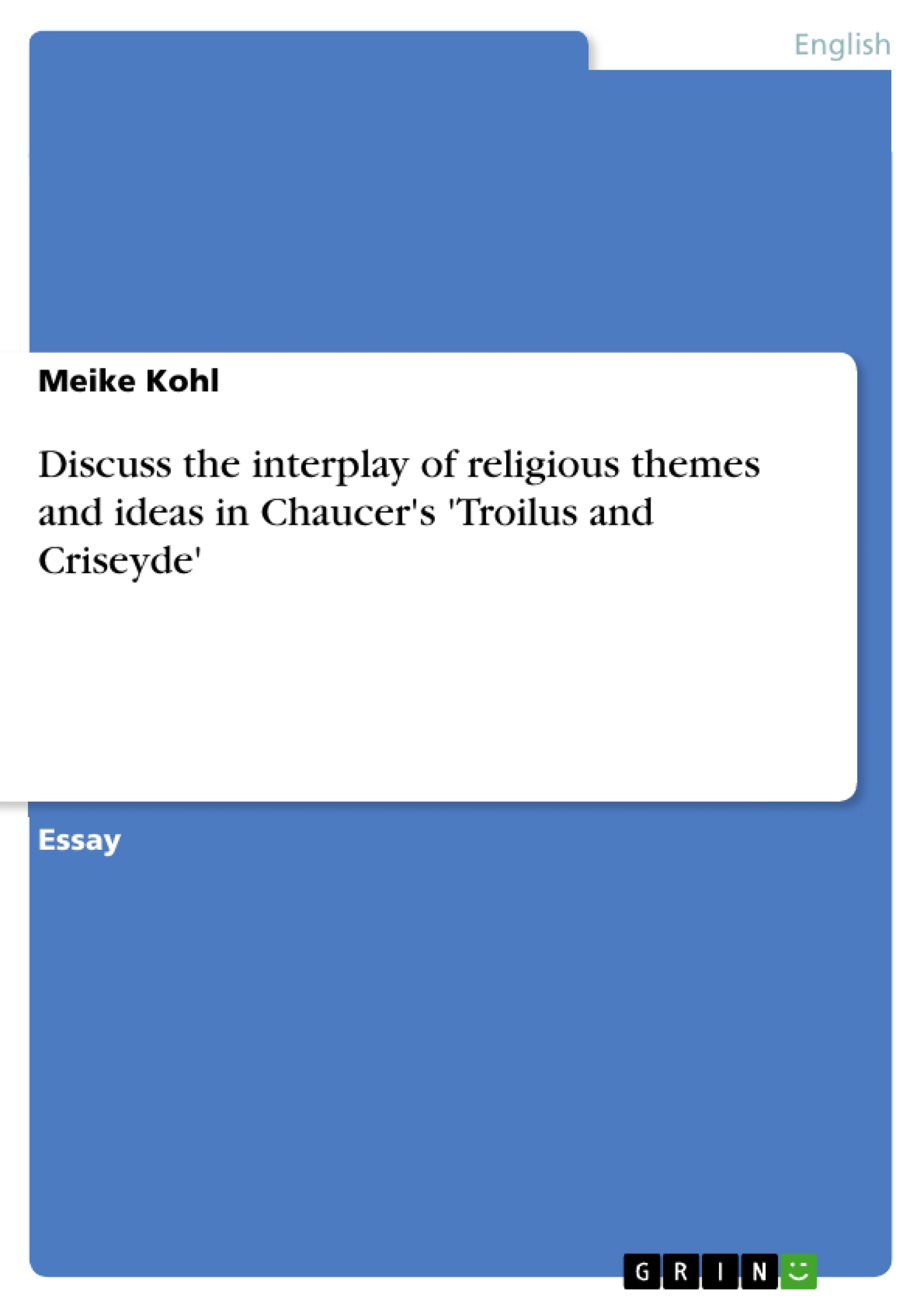Within the range of religious and secular themes and ideas in Chaucer’s Troilus and Criseyde, love in several forms is a major theme. The main body of the poem deals predominantly with human love; one can further distinguish between ‘courtly love’ according to the courtly tradition and naturalistic, sexual love. The ending of Book V attaches a Christian perspective, thus representing religious love. Throughout the poem this interplay between love and religion can be found. This essay aims to examine the interplay of these ideas in the narrative. Closely interwoven with this are the attitudes presented towards philosophical ideas, namely the role of Fortune and the question of the human being’s free will or predestination, and their relation to the representation of love. Due to the scale of this essay we will touch on these only very briefly. The analysis will start with the ‘prologue’, the first part of Book I, explain the development throughout the narrative and conclude with the epilogue, since prologue and epilogue contain condensed evidence. The main focus will be on the protagonists, Troilus and Criseyde.
Inhaltsverzeichnis (Table of Contents)
- Discuss the Interplay of Secular and Religious Themes and Ideas in Chaucer's Troilus and Criseyde
- Introduction
- The Interplay of Love and Religion in the Narrative
- Secular Love as a Source of Pain and Suffering
- Courtly Love and the Role of Honour and Truth
- The Christian Influence on Troilus's Love for Criseyde
- The Consummation of Love and its Religious Parallels
- The Moral Dimension of Love in the Narrative
- The Foreboding of the Unhappy Outcome
- The Importance of Steadiness in Love
- Troilus's Unwavering Love and Criseyde's More Practical Approach
Zielsetzung und Themenschwerpunkte (Objectives and Key Themes)
This essay examines the interplay of secular and religious themes, particularly love in various forms, in Chaucer's Troilus and Criseyde. It explores the development of these themes throughout the narrative, focusing on the protagonists, Troilus and Criseyde.
- The interplay of secular and religious love
- The contrasting approaches to love embodied by Troilus and Criseyde
- The role of honour, truth, and morality in love
- The influence of Christian concepts on the portrayal of love
- The question of free will and predestination in relation to love
Zusammenfassung der Kapitel (Chapter Summaries)
The first section of the essay examines the introduction of love in its complexity, highlighting the pain and suffering it can bring, as well as its potential for fleeting happiness. The second section explores the concept of courtly love, emphasizing Troilus's adherence to the ideal of honour, truth, and reputation in his love for Criseyde. The third section delves into the Christian influence on Troilus's love, noting the religious language used to describe his feelings and the ennoblement of his character through love.
The fourth section analyzes the religious parallels drawn in the narrative, particularly during the consummation of Troilus and Criseyde's love. It explores the ambiguity of these references, suggesting both a celebration of love and a potential ironic treatment in anticipation of the moral ending. The fifth section discusses the moral dimension of love, focusing on the foreboding of the unhappy outcome and the emphasis on the importance of stability in love.
The sixth section examines Troilus's unwavering love for Criseyde despite her betrayal, contrasting his perspective with Criseyde's more pragmatic approach to love.
Schlüsselwörter (Keywords)
The main keywords of the essay include secular love, religious love, courtly love, Troilus and Criseyde, honour, truth, morality, Christian influence, free will, predestination, and stability in love.
Frequently Asked Questions
What is the main theme of Chaucer's 'Troilus and Criseyde'?
Love is the central theme, appearing in several forms including courtly love, sexual love, and ultimately religious or Christian love at the poem's end.
How does Chaucer interplay secular love and religion?
He uses religious language and parallels to describe human love and passion, while contrasting the fleeting nature of secular love with eternal Christian values.
What role does 'Fortune' play in the narrative?
Fortune represents the unpredictable and often cruel force that governs human affairs, raising questions about free will versus predestination in the characters' lives.
How do Troilus and Criseyde differ in their approach to love?
Troilus embodies unwavering, idealistic love linked to honour, while Criseyde takes a more practical and pragmatic approach to survive her circumstances.
What is the significance of the poem's epilogue?
The epilogue provides a Christian perspective, moralizing the tragedy by urging the audience to seek the love of God rather than transitory worldly love.
- Citation du texte
- Meike Kohl (Auteur), 2005, Discuss the interplay of religious themes and ideas in Chaucer's 'Troilus and Criseyde', Munich, GRIN Verlag, https://www.grin.com/document/47913



